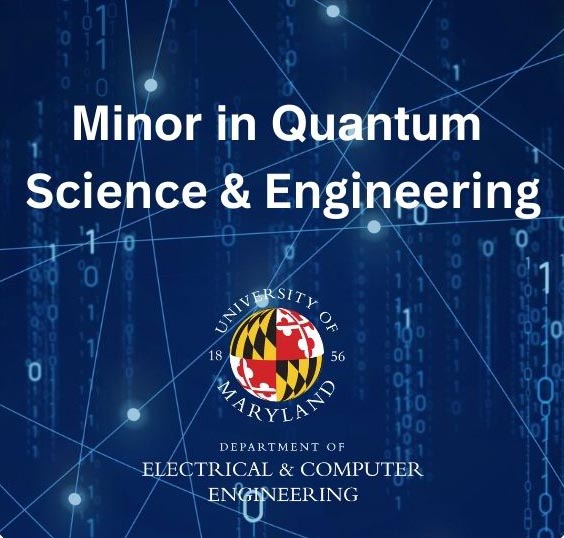News Story
ECE Introduces Minor in Quantum Science and Engineering

The Department of Electrical and Computer Engineering (ECE) announces its new Minor in Quantum Science and Engineering (QSE). The minor is a multidisciplinary program resulting from a joint effort between ECE, Physics, Computer Science, Materials Science and Engineering (MSE) and Mechanical Engineering (ME) and will be open to both Engineering (ENGR) and College of Computer, Mathematical, and Natural Sciences (CMNS) students. This undergraduate minor is the first quantum degree program on the UMD campus, and is among the first undergraduate quantum programs in the nation.
“Through a strong collaboration between ECE, MSE and ME in Engineering, and Physics and Computer Science in CMNS, the resulting minor has a wide coverage of quantum topics ranging from quantum information to quantum materials to quantum physics”, says ECE Chair Sennur Ulukus. “In addition, two hands-on labs have been developed, one focused on quantum hardware and the other focused on quantum software. In the latter students will write codes to run in the quantum computers at QLab!”
Quantum technology is one of the most significant research areas of the twenty-first century and possesses the potential to significantly transform society. We often think of quantum science and engineering focusing on applications such as quantum computing that can solve certain challenging problems faster and more efficiently than classical computers. At the University of Maryland today, we are also developing other quantum technologies that have applications in areas such as communication, artificial intelligence, measurement and detection, and cryptography.
By creating a Quantum Hub on campus, with several centers and institutes that work synergistically, the University of Maryland has positioned itself as a leader in quantum research and education. In order to move towards the future of quantum, it is important to prepare students with the knowledge needed to further the development of this discipline.
“Quantum science and engineering is a new and exciting field that many students will want to get involved with,” says Donald Yeung, ECE Professor and Associate Chair for Undergraduate Education, “The new QSE minor will allow these students to learn more about quantum and how it will impact society in the future”.
ECE Professor Patrick O’Shea, Director of Quantum Education Programming, adds, “What we’re doing here in Maryland is not just looking at how to change engineering and computer science education. We’re looking at how we change education and its application in the real world.”
We are building our education programs on the foundation of UMD’s leading research programs and centers at UMD such as the NSF Quantum Leap Challenge Institute for Robust Quantum Simulation, whose mission encompasses education as well as research. A major partner with ECE’s quantum program is the National Quantum Laboratory at Maryland (QLab). QLab is a user facility developed in 2021 by UMD spin-off company IonQ, a leading developer of quantum computing devices. QLab has been instrumental in the creation of equipment that will be used in lab courses, an integral part of the QSE minor. As Yeung explains, “One unique aspect of the QSE program is the hands-on experience with quantum phenomena and quantum computing that students will receive through two brand new lab courses. These courses will give students a physical appreciation for what quantum can do on top of the math and science theory that they will learn in their lecture courses”.
UMD is situated at the crossroads of the Washington DC/Maryland/Virginia corridor consisting of a robust quantum network of research agencies, private firms, educational partners and quantum-based startups. The university is a founder and leading member of the Mid-Atlantic Quantum Alliance, which brings together research in all these areas to collaborate and support quantum innovation.
Another UMD-led organization is the Quantum Startup Foundry (QSF), located in College Park. QSF focuses on supporting entrepreneurs, startups and established businesses by providing resources for marketing quantum technologies. Through both MQA and QSF, opportunities for students abound, including access to research labs, internships and job opportunities.
“We’re not just teaching students about quantum mechanics. We’re preparing them to think in ways that bridge the classical and quantum-computing worlds,” said O’Shea. “We educate our students to be creative quantum explorers, not just quantum-tourists.”
Requirements for the quantum minor will expose students to quantum computing technologies, algorithms for quantum computers, characteristics of quantum materials, and sensing and noise in quantum systems.
In addition to coursework, students will have the opportunity for hands-on real-world experience. Two categories of lab classes will be offered: Quantum Hardware for engineering majors and Quantum Software for computer science majors. The quantum lab will be initially housed in the A.V. Williams Building and will move to the Stanley R. Zupnik Hall when construction on that building is complete.
“Our new quantum minor complements our well-recognized strength in quantum research, and helps prepare our undergraduate students to join the workforce in this emerging field or attend graduate school and contribute to future quantum research, “ adds Ulukus.
Classes for the quantum minor will begin in the Spring 2025 semester. Application to the program will be available online from October 28th, 2024 to December 6th, 2024.
Published July 29, 2024









